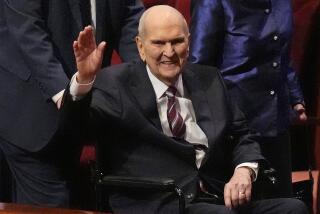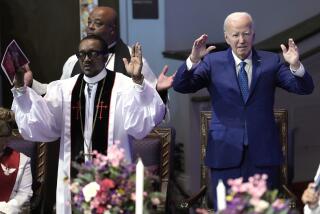For them, faith trumps works
ROCK HILL, S.C. — Here’s the problem with electing a Mormon president, as Jason Thurman sees it: “I don’t believe he would be guided by God.”
Thurman, 26, is tidying the annotated Bibles in the Shepherd’s Fold bookstore. Over by the rack of Christian CDs, his co-worker Marty Thomas raises a similar concern.
“When it comes right down to it,” says Thomas, 40, “a Mormon’s strength is human. A Christian person’s strength is superhuman. I want [a president] who has that extra on his side.”
In his quest for the Republican presidential nomination, former Massachusetts Gov. Mitt Romney -- a lifelong Mormon -- has often reminded voters that he’s running for commander in chief, not pastor in chief. What’s important, Romney says, is that he has strong faith; the details are irrelevant.
But a sharp concern about the Mormon Church shows up in poll after national poll. About one in three voters would be less likely to support a Mormon candidate. The faith draws among the most unfavorable ratings of any religion. Doubts run especially deep among evangelicals, who may account for as many as half the votes cast in Republican primaries in the South.
Some evangelicals can articulate specific Mormon beliefs that disturb them -- for instance, the teaching that only married couples can achieve the most exalted realms of heaven.
Many others want to give Romney a chance; they like his conservative politics. Yet they feel uneasy about turning over the country to a man who has a radically different -- and in their view, heretical -- understanding of God.
This is not an arcane theological dispute; to some born-again Christians, it’s at the very core of presidential leadership. If Romney does not understand what they take to be God’s true nature, can he still receive divine guidance? If he doesn’t accept the Trinity as they conceptualize it, can he still be filled with the strength of the Holy Spirit?
Some evangelicals answer “yes” to such questions: “Just because he’s Mormon doesn’t mean God can’t bless the country through him,” says Carissa James, 36, a pastor’s wife in this suburban community of 50,000.
But in the back room of Shepherd’s Fold Books, owner Thomas L. Wilson Jr. is not so sure. Dapper in a crisp bow tie, Wilson, 82, expresses “a lot of reservations” about a Mormon president. His concerns are not about Romney’s policies or his character. They’re far more fundamental: “I wonder who he figures his savior is.”
The Church of Jesus Christ of Latter-day Saints claims 13 million members worldwide, including nearly 5.8 million in the United States. Its roots stretch to 1820, when a teenager named Joseph Smith knelt in the woods of upstate New York. A pillar of light suddenly appeared above his head, Smith later wrote. Two figures descended: God and Jesus.
They told the boy to join no religion, for all were false, and to await word of the truth.
Over the next seven years, Smith said, he was visited by an angel named Moroni, son of Mormon, who guided him to buried gold plates inscribed in a mysterious language. Moroni gave Smith “seer stones” to translate the text, which told of Christ appearing in the Americas a few months after his resurrection.
Smith published his translation in 1830. Members of his church consider the Book of Mormon a holy text, a revelation from God, on par with the Bible. That alone is heretical to Christians of most denominations.
Smith laid out other novel theologies as well: Mormons hold that God is made of flesh and bone. He’s all-powerful and all-knowing, but not mysterious; he has a physical body just like man’s, and he’s even married to a Heavenly Mother. And man can become God-like after death, a concept called ultimate deification.
Mormons also believe God communicates with modern prophets -- such as the president of their church. In 1978, for instance, the Mormon president announced God had directed him to open the church to full participation by blacks, though the Book of Mormon describes dark skin as a divine mark of disfavor. Mormons fully accept the New Testament account of Christ’s life and resurrection, which in their view makes them Christian. But they don’t accept the doctrine of the Trinity -- Father, Son and Holy Ghost as one entity. Instead, they view God and Jesus as separate beings, both of flesh and blood. Given these beliefs, traditional Christians tend to view Mormonism as a cult. That perception is reinforced by the church’s secrecy, which officials say is necessary to protect their sacred ceremonies.
Outsiders cannot enter a Mormon temple after it’s been dedicated. Even practicing Latter-day Saints must have a recommendation from their bishop to attend temple weddings and other rituals.
(In the most controversial of those rites, known as baptism by proxy, Mormons scour historical records for names, then induct the dead -- by the millions -- into the faith, to give them a chance at salvation.)
This secrecy disturbs Patrick Garren, 38, a business owner here who belongs to a laid-back evangelical church favored by the Harley crowd.
“Why am I not cleared to go into your church? What is there to hide?” Garren says.
“I won’t vote for Mitt Romney, because of his faith. I don’t approve of the way they conduct business.”
His pastor, Tim Fowler, in jeans and black T-shirt, listens sympathetically but can’t quite agree. “Am I concerned about his faith? Yes. But would it stop me from voting for him? No,” says Fowler, 46. Before he makes a decision, he explains, he’ll want to learn more about Romney’s policies.
Those policies appeal to many evangelicals, especially in the conservative South. Romney has switched views on several key issues, but the strong stances he now takes against abortion and same-sex marriage resonate with voters here. His lifestyle, too, wins wide approval. In accordance with Mormon doctrine, Romney does not smoke or drink alcohol -- or even coffee -- and he gives 10% of his income to the church. He has been married to his high school sweetheart for 38 years.
That all sounds good to Rhonda Johns, who has just spent an evening at Trinity Bible Church, watching teenage girls in white gowns pledge chastity until marriage.
“Morally, there are a lot of things we have in common,” says Johns, 55.
There are, however, a few subtle distinctions.
Many evangelicals consider abortion -- in any circumstance -- murder. Mormons do not. The Mormon Church teaches that our spirits are alive long before we are conceived; the theology is vague on exactly when those spirits enter the fetus in the womb. Perhaps because of that flexibility, the church permits abortion in cases of rape or incest, if the mother’s health is at risk, or if the fetus has severe deformities.
After years as an abortion-rights supporter, Romney now opposes abortion and says he would like to protect life from conception onward. But he has declined to call abortion murder -- a hesitation that one of his opponents has tried to exploit. Kansas Sen. Sam Brownback, who is Roman Catholic but has strong ties to evangelicals, sent out a news release this month with the heading: “Mitt Romney Doesn’t Believe Abortion Is Murder.”
Romney -- who is leading in early polls in Iowa and New Hampshire -- has also faced more direct attacks on his faith. An anonymous eight-page screed against Mormons was mailed to some South Carolina residents before a Republican debate last month.
A Florida pastor named Bill Keller recently sent out a mass e-mail comparing Romney to Satan and proclaiming that Mormons would “spend eternity in hell.”
Still, Romney has not conceded the evangelical vote. He invited leading pastors to his home for dinner last fall and gave the commencement address at Pat Robertson’s Regent University in May. This courtship has paid off with public statements from leading evangelicals who have pledged to give Romney a fair hearing.
“The Mormon faith -- most Christians would consider it a cult,” says Franklin Graham, who runs an evangelical association named for his father, Billy Graham.
“But I’ve met Mitt Romney. He’s a very nice man. Very brilliant. And he’s a conservative.... In certain circumstances, I could vote for him.”
Many here agree with that assessment: In the general election, they’d much prefer a conservative Mormon to a liberal of any faith. Democrats Bill Clinton and Jimmy Carter are both born-again evangelicals -- but conservatives widely consider their presidencies disasters.
“I have no problem voting for a candidate who disagrees with me on theology. I do have a problem voting for a candidate who disagrees with me on moral values,” says James, the pastor’s wife. The women of her Bible study nod. “I think we would all say ‘Amen’ to that,” says Trudy Laub, 69.
But to reach the general election, Romney first has to win in the primaries, when Republican voters uneasy about his faith can choose another conservative.
Several women in the Bible study favor former Arkansas Gov. Mike Huckabee, a Baptist minister. They’re also eager to hear more from former Tennessee Sen. Fred Thompson.
Back at the bookstore, assistant manager Thurman puts it this way:
“If the candidates line up on policy, you go to the next line. If one’s a Christian and one’s Mitt Romney? I have a feeling I’d vote for the Christian.”
More to Read
Get the L.A. Times Politics newsletter
Deeply reported insights into legislation, politics and policy from Sacramento, Washington and beyond. In your inbox three times per week.
You may occasionally receive promotional content from the Los Angeles Times.










